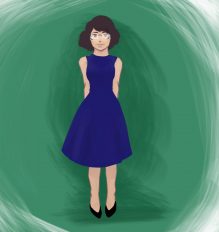Amelia's Issues

We began therapy shortly after Amelia’s 35th birthday, an age that was important to her if she were to have another child. Both she and her husband Michael wanted a third child, but both recognized that they needed to work out their relationship issues before they could take that step. Amelia didn’t see how that could happen. She felt overwhelmed by life. She had an unsatisfactory marriage, a demanding career, and wanted to be a better mother to her first two young children. In addition to better managing her high-stress life and experiencing less conflict with Michael, she hoped to find clarity through our therapy in deciding whether to have a third child. The major issues we addressed in therapy appear below.
 Amelia was often angry for trivial things. But worse than that, at certain times she would be overwhelmed with anger so great that rage is a better word for it. She would be so consumed with rage that she felt driven by an inner force as she cursed and broke things.
Amelia was often angry for trivial things. But worse than that, at certain times she would be overwhelmed with anger so great that rage is a better word for it. She would be so consumed with rage that she felt driven by an inner force as she cursed and broke things. Premenstrual Syndrome (PMS), although a well-recognized syndrome, isn’t included among the clinical diagnoses classified in the American Psychiatric Association’s Diagnostic and Statistical Manual of Mental Disorders, 5th edition (DSM 5). However, the more severe version of PMS, Premenstrual Dysphoric Disorder (PMDD), is included. The major additional requirement for PMDD is that a woman must have significant difficulty in her work or school career or have significant problems in interpersonal relationships during the premenstrual phase of her cycle. Amelia’s need to take monthly days off from work, and her acknowledged marriage-threatening rages at Michael, meant that she met the additional diagnostic criteria.
Premenstrual Syndrome (PMS), although a well-recognized syndrome, isn’t included among the clinical diagnoses classified in the American Psychiatric Association’s Diagnostic and Statistical Manual of Mental Disorders, 5th edition (DSM 5). However, the more severe version of PMS, Premenstrual Dysphoric Disorder (PMDD), is included. The major additional requirement for PMDD is that a woman must have significant difficulty in her work or school career or have significant problems in interpersonal relationships during the premenstrual phase of her cycle. Amelia’s need to take monthly days off from work, and her acknowledged marriage-threatening rages at Michael, meant that she met the additional diagnostic criteria. In Amelia’s case, her symptoms often required her to cancel two or three days of work appointments while she retreated to the bed. If she tried to push through her symptoms, she found it impossible to concentrate on the needs of her own psychotherapy patients. Outside her home or office, her lack of concentration made it difficult to drive even short distances. Her anxiety was like a weight on her chest, so that sometimes she struggled to breathe. Her anger was easily triggered at these times and might easily lead to rage-filled arguments with Michael—who also was subject to fits of anger. In addition to anxiety, irritation and anger her symptoms included fatigue, hopelessness, feeling overwhelmed, and outbursts of crying, as well as such physical symptoms as headaches, breast tenderness, acne and bloating.
In Amelia’s case, her symptoms often required her to cancel two or three days of work appointments while she retreated to the bed. If she tried to push through her symptoms, she found it impossible to concentrate on the needs of her own psychotherapy patients. Outside her home or office, her lack of concentration made it difficult to drive even short distances. Her anxiety was like a weight on her chest, so that sometimes she struggled to breathe. Her anger was easily triggered at these times and might easily lead to rage-filled arguments with Michael—who also was subject to fits of anger. In addition to anxiety, irritation and anger her symptoms included fatigue, hopelessness, feeling overwhelmed, and outbursts of crying, as well as such physical symptoms as headaches, breast tenderness, acne and bloating. After about a year in therapy, Amelia and I went over the first 20 pages of this manuscript. We were still doing therapy and it was unclear if we would heal her PMS/PMDD permanently, but we were optimistic. After reading the transcripts, she said,
“Oh my! This reminds me of how low-functioning I was. How stressed and overwhelmed I was. It was absolutely overwhelming, physically, mentally, emotionally. I am functioning now. I think back there I just dragged myself to do things I needed to do but I couldn’t do it well—like I was on autopilot, just dragging myself to one thing and then another. But I couldn’t fully enjoy them or be engaged in them. I was just trying to survive. Now I’m capable of functioning at a higher level. Even though I am still overwhelmed in many ways, I do have more control over that overwhelmness. I just know I’m not on autopilot any more. It is a different feeling.”
After about a year in therapy, Amelia and I went over the first 20 pages of this manuscript. We were still doing therapy and it was unclear if we would heal her PMS/PMDD permanently, but we were optimistic. After reading the transcripts, she said,
“Oh my! This reminds me of how low-functioning I was. How stressed and overwhelmed I was. It was absolutely overwhelming, physically, mentally, emotionally. I am functioning now. I think back there I just dragged myself to do things I needed to do but I couldn’t do it well—like I was on autopilot, just dragging myself to one thing and then another. But I couldn’t fully enjoy them or be engaged in them. I was just trying to survive. Now I’m capable of functioning at a higher level. Even though I am still overwhelmed in many ways, I do have more control over that overwhelmness. I just know I’m not on autopilot any more. It is a different feeling.” Amelia’s tendency to have angry outbursts was coincident with her ongoing depression, which she believed had been her primary mood state since the birth of her second child almost three years before. We focused much of our work on her depression as we also continued to work on her anger and emotional sensitivity.
Her experience with being pregnant with her son contrasted sharply with how she felt soon after he was born. “My pregnancy was fantastic! I was blissful and happy. After the baby was born I had no problems for four months. Then my milk dried up. With my first child, I nursed for seven months. At four months with my son, I became irritable. I couldn’t feed the baby. I had no energy to get up. Michael had to go back to work after the summer, so I had a baby and a two-year-old and no help.”
Amelia soon experienced additional emotional changes. “I became attached to the baby at this time. It relaxed me when he took the nipple, even if I had no milk. I just wanted to be with my baby. I didn’t want to be around my husband or my daughter, just my son. I would snap at and yell at my daughter.” Her alienation from her daughter later became another focus of healing work.
Amelia continued, “I went to a psychologist, who said I had postpartum depression. I saw her six months after the baby was born. I was in denial about my condition, though, and didn’t start meds until nine months. The meds helped a little. But I was still irritable, still attached to the baby. I wanted to stay home, not go out. I was still in school at night, two nights a week. The meds helped with my anger at my daughter.” Her postpartum depression continued in a mild form to the present, but continued to be experienced more intensely for a few days each month as a part of her PMS. “I started PMSing right after the baby was born, but I didn’t notice it until after I started taking an antidepressant. The postpartum was the worst part of my life.”
Amelia’s tendency to have angry outbursts was coincident with her ongoing depression, which she believed had been her primary mood state since the birth of her second child almost three years before. We focused much of our work on her depression as we also continued to work on her anger and emotional sensitivity.
Her experience with being pregnant with her son contrasted sharply with how she felt soon after he was born. “My pregnancy was fantastic! I was blissful and happy. After the baby was born I had no problems for four months. Then my milk dried up. With my first child, I nursed for seven months. At four months with my son, I became irritable. I couldn’t feed the baby. I had no energy to get up. Michael had to go back to work after the summer, so I had a baby and a two-year-old and no help.”
Amelia soon experienced additional emotional changes. “I became attached to the baby at this time. It relaxed me when he took the nipple, even if I had no milk. I just wanted to be with my baby. I didn’t want to be around my husband or my daughter, just my son. I would snap at and yell at my daughter.” Her alienation from her daughter later became another focus of healing work.
Amelia continued, “I went to a psychologist, who said I had postpartum depression. I saw her six months after the baby was born. I was in denial about my condition, though, and didn’t start meds until nine months. The meds helped a little. But I was still irritable, still attached to the baby. I wanted to stay home, not go out. I was still in school at night, two nights a week. The meds helped with my anger at my daughter.” Her postpartum depression continued in a mild form to the present, but continued to be experienced more intensely for a few days each month as a part of her PMS. “I started PMSing right after the baby was born, but I didn’t notice it until after I started taking an antidepressant. The postpartum was the worst part of my life.” Fifteen to twenty percent of mothers experiencing postpartum depression fail to develop a normal loving mother-child bond with their children. Amelia had postpartum depression after both her children, but had the attachment problem only with her first. In fact, it was the joyful and loving feelings she had when she held her son that made her aware of how serious her problem was with her first, her daughter. The Twins, one angry with her daughter and one guilty about the lack of love for her daughter, were the Parts whose healing also healed Amelia of her failure.
Fifteen to twenty percent of mothers experiencing postpartum depression fail to develop a normal loving mother-child bond with their children. Amelia had postpartum depression after both her children, but had the attachment problem only with her first. In fact, it was the joyful and loving feelings she had when she held her son that made her aware of how serious her problem was with her first, her daughter. The Twins, one angry with her daughter and one guilty about the lack of love for her daughter, were the Parts whose healing also healed Amelia of her failure.